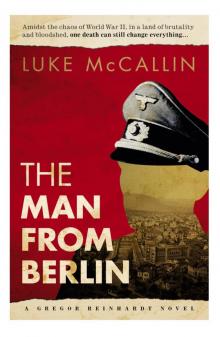- Home
- Luke McCallin
The Pale House Page 2
The Pale House Read online
Page 2
“I told you,” he slurred, gagging against the blood in his mouth as his head hinged back. “One moment we were driving, then there was firing all around, and the next thing I remember we had crashed off the road.”
“You were alone?”
The other man let go of his head, shoving it forward. Reinhardt leaned to the side and spat weakly.
“My driver was dead.” He spat, again, watching a tooth roll across the floor.
The interrogators laughed. “A tooth, Reinhardt? You need to be careful with them. Still, there’s plenty more where that one came from, right?!”
“Captain Reinhardt.”
Reinhardt pulled his eyes back from the past, lifted them over the glass standing untouched between his forearms and the second glass standing brimful across the table. A cigarette burned slowly between his fingers, and a harsh line of light lay across the inside of the tavern. It pulled form from shadow, flowed across the other men in the bar and pushed up against the cigarette smoke that roiled and twisted in the pull of air.
“Captain Reinhardt.”
His back tensed up, and he looked around slowly, looking across the tavern at a sergeant of the Feldgendarmerie standing by the door, his gorget bright across his chest. A second Feldgendarme, a lieutenant, stood to one side, and Reinhardt’s stomach clenched, wondering if they had found him at last, and if the man he had been waiting to meet had had anything to do with leading them here.
“Captain Reinhardt. Identify yourself.” The Feldgendarmes’ eyes turned steadily across the room, eyes swinging from face to face, pushing and probing.
“I am Captain Reinhardt,” he said, turning and standing.
The two Feldgendarmes turned toward him as one, and Reinhardt felt real fear. They were not Feldgendarmes. They looked like them. They wore uniforms like a Feldgendarme’s, with metal gorgets around their necks, but on their left arms, which had been hidden from him, they wore red bands, with black lettering stenciled across them. On each of them, the Iron Cross shone dully on their left breasts.
They were Feldjaeger.
“You will come with us,” the sergeant said.
“Why? I have done nothing wrong.”
“We have orders to deliver you to Feldjaegerkorps headquarters.”
The bar went even quieter, if that was possible. Reinhardt said nothing, then swallowed hard at the lump that squatted suddenly in his throat. Had Koenig betrayed him? Had Koenig been trying to get to him to warn him of this?
“What does the Feldjaegerkorps want with me?”
“Ask someone who knows what we’re talking about,” said the lieutenant. “Get moving, Captain, and come with us.”
Only the Feldjaegerkorps could speak like that, a junior officer ordering a senior one in that fashion, but whatever pride Reinhardt felt might have been hurt, he ignored it. He looked at his drink, imagined knocking it back, imagined wincing at its burn across his mouth, but he just stubbed out his cigarette and shrugged into his coat, hoping neither of the Feldjaeger would wonder why a man sitting at a table alone would have two drinks in front of him. He picked his way carefully through the silent bar, between the tangle of legs and over puddles of cloth where greatcoats hung over the backs of chairs and spread gray skirts across the tiled floor. The two Feldjaeger split to each side of the door, passing him through, their faces expressionless as they followed him under the dim glow of the entrance light and up a flight of stairs to the darkened streets and into a heavy, wet cold.
Reinhardt’s stomach rumbled and he ran his tongue around his mouth, all thickened and sticky, probing the gap in his back teeth. He clenched his jaw, drawing in a deep breath of cold air. It punched through his teeth, waking him, rooting him firmly. The lieutenant stepped in front of him, and the sergeant put a firm hand on his back and escorted him over to a black car, its outline pearled in the damp air. The lieutenant opened the back door and followed Reinhardt inside, the car rocking and swaying on its suspension. The sergeant clattered the engine into life and then hauled the car out onto the road.
Reinhardt stared out of his window as they drove, the darkened and blacked-out streets sliding past like a sunken city beyond the sparkled pane of the window. His mind turned over and over what might have happened to put them on to him but could find nothing. They had done nothing, their so-called resistance cell, since July, when the world had seemed to stand still in the aftermath of the attempt on Hitler’s life. They had watched as others elsewhere had taken their chance. They had waited as the machine they had hoped had been dealt a death blow had stuttered and then roared back into life. Then they had hoped and prayed for the best, until one of their number had vanished into buildings of concrete and steel and never come out again, and then a second, and the cell had scattered after rushed and furtive good-byes if there were any good-byes at all, eyes hooded far back beneath darkened brows.
Days, then weeks, then months, almost no news of the others, and no one had come looking, or knocking, until tonight. Reinhardt’s mind turned over and over, and he wondered at last, battening onto it with a sudden desperation, why it was the Feldjaeger who had come for him, and not the Gestapo, or the SS.
The car hammered its way through the wet night, down the wide boulevard of Stubenring, up to what Reinhardt recognized as the old Austro-Hungarian defense ministry building, now one of the main German headquarters in the city. A huge swastika flag hung like a crimson smear down the front of the severe gray structure, all vertical lines and ornate stonework under a copper-colored roof. They drove along the side of the vast building and around the back, weaving through barricades and skirting a spill of rubble from a part of the building that had collapsed in a recent bombing raid.
The lieutenant motioned Reinhardt out of the car, and he shivered once in the cold. He followed the lieutenant inside, past a pair of Feldjaeger on sentry duty warming their hands at a metal brazier. It seemed even colder inside as he followed the Feldjaeger through the warren of the building, up stairs and around landings and farther up until the lieutenant knocked at a door and opened it, ushering Reinhardt into an anteroom.
A corporal, his tunic studded with decorations, took Reinhardt’s coat and knocked at a second door. A muffled answer came. Reinhardt walked into a long office, a desk standing at one end in front of a fall of heavy curtains, and a lamp with a green shade burned on the desk, carving the face of the officer who sat there into harsh lines of light and shadow. The rest of the room was dark, and it took Reinhardt a moment longer to realize there was a third man in the room, sitting in a deep chair far back in the shadows.
“Captain Reinhardt,” said the officer at the desk, as the corporal shut the door with a whisper of wood. The officer indicated a spot in front of the table, and Reinhardt came to attention. The officer was a major and, like all the Feldjaeger he had seen and heard of, wore a clutch of decorations, starting with the Knight’s Cross at his throat.
“Captain Gregor Sebastian Reinhardt,” the major said, reading from a file on his desk. “Born 1898, in Köpenick, Berlin. Father, university philosophy lecturer. Mother, housewife. No siblings. Officer cadet school, 1914 to 1916. Active service on the Eastern Front. Transfer to Western Front and induction into stormtroopers in 1917. Served with distinction in Operation Michael. Won Iron Cross at Amiens, 1918. First- and Second-Class Crosses the same day.” The major paused, looking up at Reinhardt, his eyes focusing on the Iron Cross. Reinhardt felt desperately uncomfortable under his scrutiny, and that of the other man he could not really see. His skin prickled with sweat, and he forced himself to breathe slowly, evenly, ignoring the slight tremor as he took each breath in.
“Severely wounded,” the major continued, speaking of Reinhardt in the third person, “and honorably discharged with one third-level invalidity in December 1918. Joined Berlin police force as detective in 1920 and rose to the rank of chief inspector. Posted to Interpol here in Vienna 1938. Resi
gned from Kripo 1938, joined Abwehr. Assigned as intelligence officer in the invasion of Norway. Won Narvik Shield. Participated in invasion of France, 1940. Invasion of Yugoslavia, 1941. Assigned to Afrika Korps as divisional intelligence staff. Invalided out of Afrika Korps 1942. Assigned to Abwehr office Sarajevo, Partisan counterintelligence.” The major paused again, frowned, turned a page, then let it fall back. “And this is where a fairly good career derails. Fell afoul of a Gestapo investigation following his role in a murder investigation. A general was implicated, who later died in action.” The major looked up. “Rather a lot of people were upset with you over that, were they not?” Reinhardt was not sure it was a question, and so kept quiet, focusing on a spot just over the major’s shoulder, and pushed his tongue into that gap in his teeth. “Wounded in action again, questioned . . . intensively . . . by the Gestapo. Acquitted. Obviously. But no one seems sure what to do with you. Reassigned from Abwehr and posted in August 1943 as an intelligence liaison officer to 1st Panzer Division in Greece, then to 12th Army in Belgrade. Pretty dull stuff. I think that was the point, no? But it didn’t stay that way, did it?” The major’s eyes needled at him, and his skin prickled tight again. “Evacuated to Vienna from Belgrade in October 1944 following the Soviet offensive. Mentioned in dispatches for extreme bravery in covering the retreat from Belgrade. Received the German Honor Roll Clasp in November this year.”
There was a creak of leather as the third man rose and stepped into the light. The third man was a colonel with a head of cropped dark hair shot with gray, a round head balanced on wide shoulders. He stooped over the desk, almost delicately taking the page from the major and turning it back. He read a moment, then looked up at Reinhardt.
“That investigation into General Verhein. In Sarajevo. Tell me about that.”
“What exactly, sir?” said Reinhardt, surprised to find his voice steady.
The colonel pursed his lips, straightening up. “At a wild guess, you were told to stop that investigation as soon as you had a general in your sights. But you didn’t. What happened?”
“I pursued an investigation to its end.”
“Meaning?”
“I went where the evidence took me rather than where expedience suggested.”
“Tell me about the retreat from Belgrade.” When Reinhardt said nothing, the colonel seemed almost sympathetic. “What was the mention in dispatches for?”
“Covering the retreat of the main field hospital.” The colonel said nothing, indicating with his silence that Reinhardt was to continue. “I received late intelligence that part of the Soviet advance would threaten the hospital’s withdrawal. Communications were down, so I went out to warn them.”
“And you gathered together a ragtag bunch, including walking wounded and stragglers, and fought off the Russians long enough for reinforcements to arrive. Quite something. First time going up against the Russians?”
“Since 1917, yes.”
The colonel snorted, and the major smiled, a flicker across his lips. “And?”
“And I’d be perfectly happy going another nineteen years before tangling with them again.”
The colonel stared at Reinhardt, then down at the major. Something imperceptible seemed to pass between them, and the colonel folded himself back into the shadows. The major closed Reinhardt’s file and rustled a sheet of paper across his fingertips.
“Captain Reinhardt, effective immediately, you are transferred to the Feldjaegerkorps.”
The major’s words fell into a heavy silence. Reinhardt stood unspeaking, not believing what he had just heard.
“Are you familiar with the Feldjaegerkorps, Captain?”
“Yes, Major.” Reinhardt swallowed. “Somewhat.”
“Enlighten me.”
“Military police.”
“Go on.”
“But with a difference.”
“Correct,” said the major. “The Feldjaegerkorps accepts only decorated combat veterans. Officers and NCOs, no enlisted men. We report directly to the armed forces high command. As such, even a corporal has more authority, should he choose to exercise it, than an officer. We have independent tasking, and full authority to maintain discipline in the army’s rear areas.”
“Full authority,” repeated Reinhardt. Something seemed to snap inside, that small part of him that could not help but prod and poke and provoke in situations like this. “Drumhead courts-martial and on-the-spot executions.”
“Sometimes, yes,” the major replied. “There’s more to it than that, though.”
“It’s about being a policeman again,” the colonel said, quietly, from the shadows. “What you used to be, no? What you still think you are.”
“But a military policeman?”
“I would remind you we are both military policemen, Captain,” said the colonel.
“Yes, sir, I apologize,” said Reinhardt, straining to bring himself under control. “It’s not what I meant. I meant . . .” He trailed off, his eyes searching for something, anything, in the blank walls and the long, ink-dark folds of the curtains. “I mean, this morning, I woke up and I’m still a divisional intelligence officer.”
“Imagine our surprise as well,” said the major, dryly.
“Sir, may I ask, who recommended me for this?”
“Indeed,” said the colonel, standing and stepping back into the light. “Your commanding general was rather persuasive.”
“Sir, do I have any choice in this?”
“None.” For the first time, the colonel’s voice and face firmed, hardened, a boundary against which Reinhardt saw there could be no compromise.
“Very well,” said Reinhardt, straightening. “I am grateful for this honor, sir.”
The ghost of a smile flickered again across the major’s lips. “Don’t overdo it, Reinhardt,” he murmured.
“Where are we to be posted?”
“We are being detached from Feldjaeger Commando III, here in Vienna. We’re going south. Very soon. The southern front’s a mess.”
The major came around the table and offered Reinhardt a piece of paper. “Your transfer orders. Be back here by noon tomorrow, with your pay book. We’ll get that updated soonest. And put this on,” he said, offering Reinhardt a folded piece of red cloth, wrapped around something heavy.
The red cloth was an armband wrapped around a crescent-shaped gorget. Reinhardt paused, then wormed the armband over his wrist and up on top of his sleeve. It sat there, red on gray, black letters stenciled across it that denoted the unit and the source of its authority—Feldjaegerkorps, Armed Forces High Command—and it seemed to tighten, and grip, like a manacle, and something shifted abruptly deep inside him, but what it was he did not know, and could not wonder at now.
“Welcome, Captain,” said the colonel, extending his hand. “I am Colonel Scheller. And this is Major Hassler.”
Reinhardt shook hands with them both before Major Hassler walked him to the door. He paused as it opened, the corporal standing just outside with Reinhardt’s coat over his arm. “Sir,” he said to Scheller, “if I may ask. I am sure you do not welcome all recruits to your unit like this. So, why me?”
Scheller nodded. “You are not quite the officer we normally take,” he said, walking slowly over toward Reinhardt, his hands in his pockets, “and so we wanted to have a look at you. But your record is good, and we will value your particular experience in the Balkans and your police background. Think of it like this: We also go where the need takes us, not where we’d always like to go.” He stopped and pursed his lips, his upper lip folding down into the lower and his eyes fixed on Reinhardt’s. “Like I said, you do come highly recommended.”
There was another driver for Reinhardt downstairs waiting beside a kubelwagen with a canvas roof, a tight-lipped corporal who nevertheless grunted a brief welcome and remained mercifully silent as he drove Reinhardt back through the ci
ty to the barracks hard by the Donau Canal. Reinhardt stood in the dark as the car pulled away, looking up at the blank façade of the building, before turning away and walking across to the waterfront. He lit a cigarette, closing his eyes against the flare of the match, and stared down at the dull, leaden shift of the canal, blinking against the trickle of water in his eyes left by the drizzle that had begun, trying to make sense of it all. He leaned against a carved balustrade, his fingers curling and clenching across the cold metal of the gorget, and started to shiver as the stress began to flow out of him. No arrest, no accusations. Only a transfer. With shaking fingers, he lifted the cigarette to his lips, before lifting his face to the night sky and realizing the cold he felt was the night wind across his tears.
“Reinhardt?”
He turned at the crunch of steps. A shape pulled itself out of the dark next to him. “Koenig?”
“It’s me,” Koenig said, his uniform showing him a captain of infantry.
“You shouldn’t be here,” said Reinhardt.
“I know. The others . . .” Koenig paused, his voice low. “I saw you being driven away from the bar. We . . . we were worried. They asked me to watch for you. What happened?”
“A transfer happened.” Reinhardt offered him the paper, then struck a match, watching the surprise bloom fast across Koenig’s face in the wavering light before it flickered out.
“Feldjaegerkorps?” breathed Koenig, huskily, from out of the new dark. “My God, Reinhardt . . .” And was that a hint of jealousy in his voice?
“You want it, you can have it.”
“Reinhardt, don’t be a fool,” hissed Koenig. “The Feldjaegerkorps is a powerful unit. It has powers and access. In it, you will be beyond suspicion. You will be in a privileged position. You are still one of us. Are you not?”
“Of course.”
“When you woke this morning, still an intelligence officer, you were also one of us?”
“Yes.”
“A member of the resistance.”
“Yes, I said.”

 The Divided City
The Divided City The Pale House
The Pale House The Man from Berlin
The Man from Berlin The Pale House (A Gregor Reinhardt Novel)
The Pale House (A Gregor Reinhardt Novel)